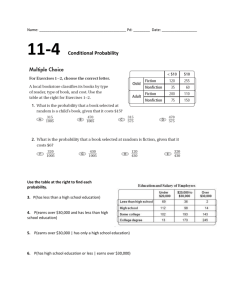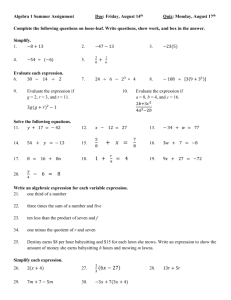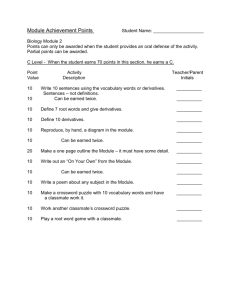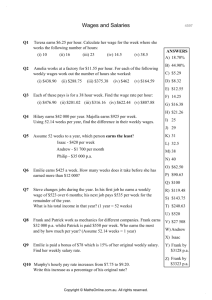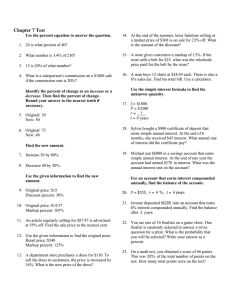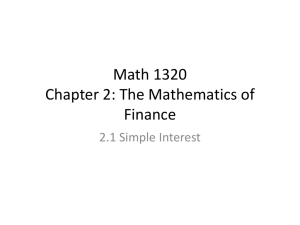Development and Service Integration Committee Thursday, December 15, 2011 10:00 – 11:30 a.m.
advertisement
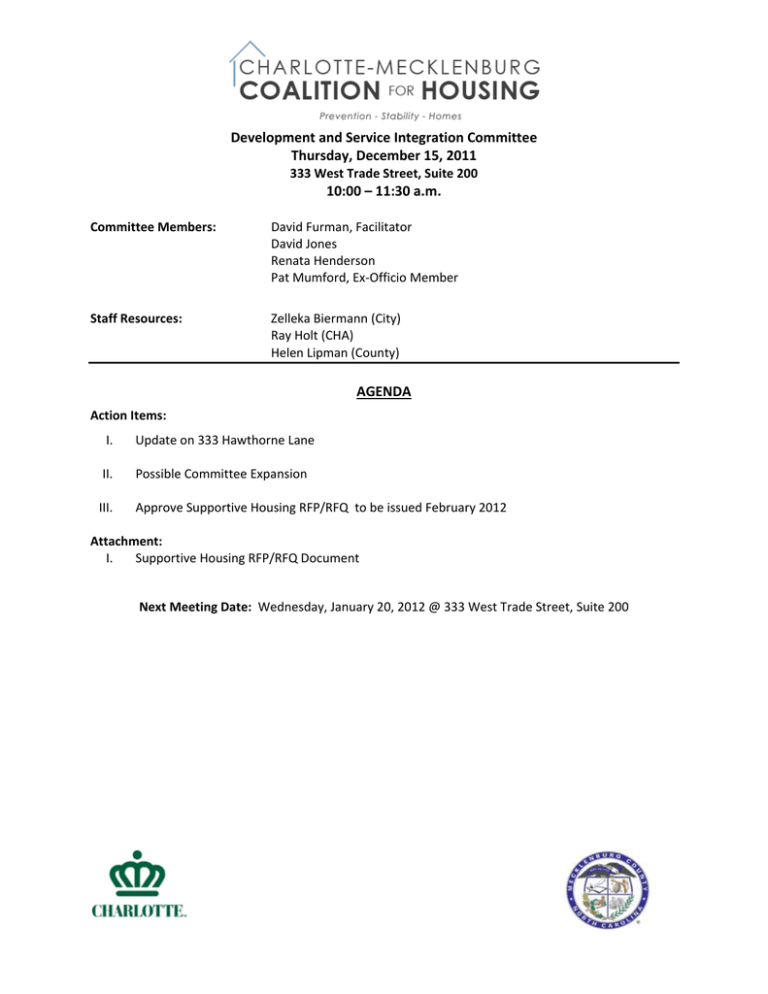
Development and Service Integration Committee Thursday, December 15, 2011 333 West Trade Street, Suite 200 10:00 – 11:30 a.m. Committee Members: Staff Resources: David Furman, Facilitator David Jones Renata Henderson Pat Mumford, Ex‐Officio Member Zelleka Biermann (City) Ray Holt (CHA) Helen Lipman (County) AGENDA Action Items: I. II. Update on 333 Hawthorne Lane Possible Committee Expansion Approve Supportive Housing RFP/RFQ to be issued February 2012 III. Attachment: I. Supportive Housing RFP/RFQ Document Next Meeting Date: Wednesday, January 20, 2012 @ 333 West Trade Street, Suite 200 Charlotte-Mecklenburg Coalition for Housing Supportive Housing Development – FY2012 Program Year RFP Submission Requirements and Evaluation Criteria Section I: Purpose The City of Charlotte, Mecklenburg County & the Housing Authority of the City of Charlotte are now accepting proposals for Supportive Housing Development (new construction, rehabilitation and acquisition/rehabilitation). Supplemental funding is available for projects in the approximate amounts: City of Charlotte Housing Trust Fund Capital: $7.3M Charlotte Housing Authority Capital: $ TBD Charlotte Housing Authority Operational Section 9 Subsidy: TBD units Mecklenburg County Supportive Services Funding: $ TBD (assistance for supportive services and/or social work staff) Capital Funding may be in the form of a loan or grant for the development of Supportive housing on land and/or structures controlled by the proposer. Operating Support, Rental The RFP Schedule is shown below: Activity Pre-Submission Conference: Neighborhood and Business Services – Housing Services 600 East Trade Street Charlotte, NC 28202 Issue Request for Proposal Cut-off Date for RFP Questions Proposal Due Date Neighborhood and Business Services – Housing Services 600 East Trade Street – Suite 109 Charlotte, NC 28202 Proposal Clarification Period Scheduled Date Thursday January 19, 2012 10:00 a.m. Thursday, February 9, 2012 Thursday, February 16, 2012 Friday, February 24, 2012 By 5:00 p.m. March 5, 2012 to March 12, 2012 April 2012 Selection of Proposals for Funding Recommendation By Staff Housing & Neighborhood Development Committee April/May 2012 recommendation City Council, County Commission & CHA Board Approval May/June 2012 ** The above dates are subject to change at the discretion of the City of Charlotte 1 The Supportive Housing Request for Proposal will have the following application schedule for additional funding rounds, based on the availability of funds: Round 2 Round 3: Proposal Due Date September 11, 2012 February 12, 2013 Issue Request for Proposal July 16, 2012 December 12, 2012 Section II: Submission Requirements – Supportive Housing 2.0 Application Submission The proposal (application and attachments) must be submitted on Flash Drive, Disk, or other electronic media. 2.1 Applicant Should Supply The Following Information (Development): A. Description of the applicant’s expertise in developing and operating housing developments to include: General contractor’s track record and experience Property Management experience with similar developments Development team is subject to meet Small Business Enterprise (SBE) requirements to ensure that the city continues its commitment to enhance opportunities for small business. Charlotte Housing Authority will have Section 3, Women and Minority Business Enterprise (WMBE) and Davis Bacon requirements B. Minimum of three (3) references that can speak directly to the applicant’s development experience. C. Applicant’s financial statements prepared by a certified public accountant for current year and previous year. Most recent independent audit Auditor’s management letter D. Applicant’s organization/background information: Legal name of business Director/President/Managing Member of the organization Articles of Incorporation and current bylaws IRS 501c(3) determination letter (if non-profit) Type of Organization, (corporation, general partnership, Limited Liability Corporation, etc.) List of Board of Directors (Include address and telephone numbers). List officers and their positions Current organizational chart 2 Federal Tax ID# or Social Security # of owners States in which currently doing business as Supportive Housing developer E. Complete disclosure of any outstanding judgments. F. Certificate of Good Standing from the North Carolina Secretary of State or State where the developer/development team is incorporated. G. Verification that all state and federal taxes, including IRS withholdings are current. H. The City conducts criminal background checks. The background checks will not be the sole basis of a loan/grant decision, but will be a factor in considering an application for funding. The City will also verify with the U.S. Department of Housing and Urban Development that the development team members are not on its “debarred” contractor’s list. 2.2 Applicant Should Supply The Following Information (Supportive Services): I. Description of the applicant’s expertise in developing and operating supportive services to identified populations to include: Agencies’ track record and experience with identified population Staff experience, education and training (?include resume of all staff involved in this project) Agency and Staff experience with similar populations and support services J. Minimum of three (3) references that can speak directly to the applicant’s supportive services and identified population experience. K. Applicant’s financial statements prepared by a certified public accountant for current year and previous year. Most recent independent audit Auditor’s management letter L. Applicant’s organization/background information: Legal name of business Managing Members of the organization Articles of Incorporation and current bylaws IRS 501c(3) determination letter (if non-profit) Type of Organization, (corporation, general partnership, Limited Liability Corporation, etc.) List of Board of Directors (Include address and telephone numbers). List officers and their positions Current organizational chart Federal Tax ID# or Social Security # of owners States in which currently conducting businesses M. Complete disclosure of any outstanding judgments. 3 N. Certificate of Good Standing from the North Carolina Secretary of State or State where the agency is incorporated. O. Verification that all state and federal taxes – including IRS withholdings are current. P. The City conducts criminal background checks. The background checks will not be the sole basis of a loan/grant decision, but will be a factor in considering an application for funding. 2.3 Project Information Description and scope of the project, including its history, goal and population served Number and types of units (i.e. affordable) Income levels to be served (specify the number of units at each income level Statement of the purpose of the loan/grant request and projected impact on the project Statement of project costs and verification of any committed and/or anticipated funding for the project (i.e. approval letters, letters of intent, and feasibility letters). Statement of details of any pending litigation. Project appraisal or a third party assessment, which determines fair market value and replacement cost will be accepted. Map with location and directions to the site Proximity to amenities – medical, groceries and mass transportation Legal description of real estate Zoning and deed restrictions Utility availability letters Description of any significant site condition(s), i.e environmental, topography and soils conditions Description of historically significant conditions requiring Historic Review (if applicable) The number of years the unit will remain affordable (period of affordability). Description any community/neighborhood meetings regarding the proposed project and actions taken to mitigate neighborhood opposition or letters of recommendation indicating community support. Description of project oversight that will be used to manage the development, such as property maintenance, resident safety and asset management plan that documents policies, strategies, financing plans and reporting systems that are used to sustain and ensure the continued viability of the development. Real Estate Taxes - State in detail the assumption used to arrive at the annual real estate taxes proposed in the pro-forma. 2.4 Supportive Services Information Description of any supportive services and the hours per week per unit. Detailed management plan for the designated Supportive population. Resident Service Plan Coordination of Care to residence Coordination with property management Staff Client Ratio 2.5 Graphic Illustrations (8-1/2 X11) – Color preferred Site Plan 4 Building elevations/renderings Floor plans 2.6 Project Readiness and Feasibility Evidence of site control – (Site control can be exhibited through an option to purchase, purchase contract, executed deed or a City-approved lease of at least as long as the requested loan term or period of affordability). Compliance with local planning, zoning and flood plain requirements 2.7 Project Financing Statement detailing use of the City grant proceeds Proposed sources and uses of funds (include all sources of project funding) Proposed project schedule (includes dates for initial closing, construction start, substantial completion, lease up and occupancy Project budget Proposed project proforma (with assumptions, rents, % of annual change in income and expenses) 20-year proforma for multi-family rental developments Detail of developer fees and equity shares. 2.8 Eligible Rehabilitation Activities that are major in scope including but not limited to: structural, mechanical and electrical repairs, roof, windows, doors and work required when it has been determined that the useful life is 5 years or less and projects where rehabilitation is needed to make the units habitable. Repairs such as painting, replacing floor covering, and trim work are only eligible when they are part of a larger project. Rehabilitation applications must: Have been placed in service on or before December 31, 1996 Require Rehabilitation expense in excess of $15,000 per unit as supported by a physical needs assessment completed within 12 months of application Not have acquisition cost in excess of 60% of the total replacement costs Not have begun or completed a full debt restructuring under the Market to Market process (or any similar HUD program) within last 5 years. Not deteriorated to the point of requiring demolition 5 SECTION III - EVALUATION CRITERIA – SUPPORTIVE HOUSING Complete proposals submitted to the City will be reviewed, evaluated and scored based on the following criteria: % within Category Rating Points Period of Affordability 7% 7 Number of Affordable Units within the Development 31% 10 Income Level Served 31% 10 On-Site Supportive Services and/or Programs 31% 10 100% 37 Track Record with Similar Development (s) – for Developer 25% 6 Development Team Experience with Similar Developments 20% 5 Property Management & Experience with Similar Developments 20% 5 Agency Supportive Service Experience with identified population 20% 5 Staff Experience with Supportive Services for identified population 15% 4 100% 25 Amount of City Funding Requested (Leverage) 43% 10 City Investment per Eligible Unit 43% 10 Debt Coverage Ratio or No Debt Allowance 14% 3 100% 23 Elderly 10% 5 Homeless families (HUD Definition) 20% 10 Special Needs - Veterans & HUD Definition of Special Needs Population 30% 10 Combination of Homeless families, Elderly and/or Special Needs 40% 15 Total Maximum Points 100% 15 Housing Efficiencies/Green Building Techniques 20% 5 Development in a Transit Station Area 40% 10 Proximity to Amenities and Services 40% 10 100% 25 Categories Development Strengths – (37% of Total Score) Total Maximum Points Development Team & Supportive Services Experience – (25% of Total Score) Total Maximum Points Financial Strength - (23% of Total Score) Total Maximum Points Priority Population - (15% of Total Score) Bonus Points Total Maximum Bonus Points 6 EVALUATION CRITERIA – Supportive Housing Definitions and Points: Development Strengths – 37% of Total Score (52 Points) A. Period of Affordability Less than 20 Years earns 2 point 20 to 40 Years earns 4 points Between 40 to 50 Years earns 6 points Greater than 50 Years earns 7 points B. Number of Affordable Units with the Development Between 20% to 35%, earns 4 points Between 35% to 50%, earns 6 points Between 50% to 65%, earns 8 points Greater than 65%, earns 10 points Affordable units defined as the percentage of the total units that are made affordable to households earning 60% or less than the area median income. At least twenty percent 20% of the units within a development must be set-aside for income eligible households in order to be considered for this program. However, housing developments located within transit station areas may set aside a minimum of 5%, but no more than 25% of the units for income eligible households. C. Income Levels Served Percentage of units serving those at 30% AMI or Less Points Earned AMI of Total Units 10% to 25% of units 26% to 40% of units 41% to 55% of units Greater than 55% of units 4 6 8 10 This program is directed primarily toward rental housing developments serving in whole or part households earning 60% or less of the area median income (AMI) with a priority given to rental developments serving households earning 30% or less than the AMI. 4. On-Site Supportive Services and/or Programs – Points will be awarded based on the intensity of services and the type of services offered. Eligible services can be provided by onsite staff, outside provider and/or volunteers, earns up to 10 points. (See table on next page) 7 On-Site Supportive Services Provided Points Earned On-Site Healthcare component provided: 2 hours per week 4 hours per week Supportive Activities that promote self-sufficiency Example: Grocery store trips, money management, cooking classes 6 8 4 activities per week (minimum of 1 hour in length) 8 activities per week ( minimum of 1 hour in length) 12 activities per week (minimum of 1 hour in length) 6 8 10 Case Management Services: Permanent/SRO: A ratio of 1 case manager per 15 residents Shelter: A ratio of 1 case manager per 35 residents is to be provided 20 hours per week 40 hours per week 8 10 Development Team Experience – 25% of Total Score (25 Points) 1. Track Record with Similar Development(s) – for Developer -6 points 2. Track Record with supportive services delivery to identified population – for Supportive Service Provider: No experience, earns 0 points Experience with up to 5 similar developments, earns 3 point Experience with more than 5 similar developments, earns 5 points The developer must demonstrate a track record developing projects similar to the one proposed. The points awarded in this category are based solely on the developer’s experience. Similar developments are defined as similar to the proposed project. The Developer should have an active role throughout the duration of the project in the projects identified, (i.e. decision maker, principal). 3. Development Team Experience with Similar Developments No experience, earns 0 points Experience with up to 5 similar developments, earns 3 points Experience with more than 5 similar developments, earns 5 points Points in this category are based on the experience of the entire development team including but not limited to the developer, general contractor and architect. Similar developments are defined as similar to the proposed project. 4. Property Management Experience with Similar Developments No experience with subsidized units, earns 0 points Experience with subsidized units (i.e. Tax Credits, Section 8, etc.), earns 3 points Specific experience – projects similar to the proposed development, earns 5 points A maximum of four points can be earned in this category based on experience with 8 subsidized units combined with specific experience with developments similar to the proposed development. A property manager must at a minimum have over two years experience with one development that is similar to the proposed development. Financial Strength – 23% of Total Score (23 Points) 1. Amount of City Funding (Leverage) Leverage Ratio Less than 1 to1 1 to 1-1.99 1 to 2-2.99 1 to 3-3.99 1 to 4-4.99 1 to 5 or greater Points Earns 1 Points Earns 2 Points Earns 4 Points Earns 6 Points Earns 8 Points Earns 10 Points Note: The leverage ratio: HTF funds divided by other financing 2. City Investment Per Eligible Unit/Room/Bed Permanent /SRO Housing Per Unit Over $40,000 $30,000 to $40,000 $20,000 to $29,999 $10,000 to $19,999 $10,000 or less Points Earned 2 Points 4 Points 6 Points 8 Points 10 Points 3. Debt Coverage Ratio - The debt coverage ratio is based on “hard debt” (debt service contractually obligated to be repaid). The net operating income over the debt service determines debt coverage ratio. Projects without “hard debt,” earn 3 points. Debt Coverage Ratio Less than 1.15 1.15 to 1.20 Greater than 1.20 to 1.25 Greater than 1.25 Points Earns 0 Points Earns 3 Points Earns 2 Points Earns 1 Points Priority Population – 15% of Total Score (10 Points) Population Served – Special Needs population is defined as individuals/households, who are: A. Elderly - Minimum age of 62 years and not a member of the homeless and nonhomeless with Special Needs population as stated below, earns 5 points B. Homeless – persons sleeping in emergency shelters or places not meant for human habitation, (i.e. cars, parks, abandoned buildings), earns 10 points 9 C. Special Needs, persons with: 1. 2. 3. 4. 5. 6. 7. D. Veterans (including veteran families & singles), earns 10 points Mental disabilities, earns 10 points Physical disabilities, earns 10 points Developmental disabilities, earns 10 points Substance use disorders, earns 10 points Diagnosed with AIDS/HIV, earns 10 points Other special populations. As approved by the Charlotte-Mecklenburg Coalition for Housing Advisory Board, earns 10 points. (Other special populations must be described in detail). A total of 15 total points can be earned for a combination of supportive housing population served, (i.e. elderly and disabled). Bonus Points – Maximum of 25 Points 1. Green Building Techniques/ Housing Efficiencies - All new construction projects must comply with Energy Star standards. Development that has incorporated green building techniques including but not limited to the following areas as: a) b) c) d) e) Energy efficiency and renewable energy Sustainable site planning Safeguarding water quality and water efficiency Conservation of materials and resources Indoor environmental quality One green building technique Two to three green building techniques Four to five green building techniques All five green building techniques = = = = Earns 2 points Earns 3 points Earns 4 points Earns 5 points Note: Developers should specify green building techniques that are not included above. 2. Development in a Transit Station Area: See Assisted Multi-Family Housing within Transit Station Areas (General Loan and Grant Guidelines for Housing Development) for guidelines for Transit Station Area development, earns 10 points 3. Proximity to Amenities and Services: Development is located within 1/2 mile of the following: medical facilities (including pharmacy); groceries and; mass transportation Medical facilities or groceries only, earns 4 points Mass transportation or two other amenities/services, earns 6 points Mass transportation plus one other amenity/service, earns 8 points All three amenities/services, earns 10 points 10
